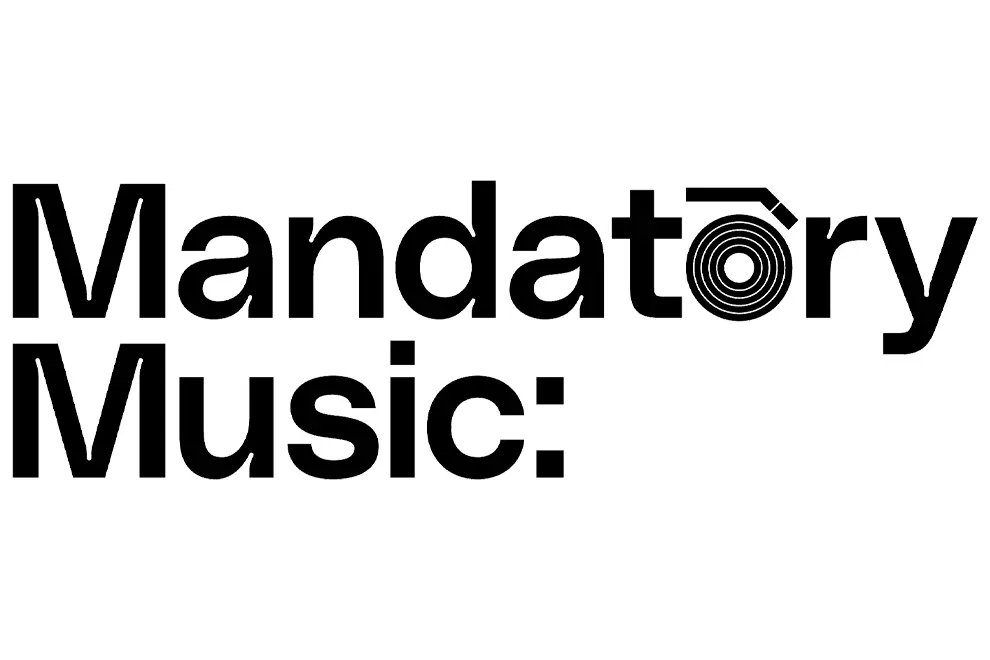You’ve likely not heard of Mandatory Music before.
Described as a ‘collective of independent Australian artists doing it THEIR way’, Mandatory Music was established in 2021 by Joe Landini and Will Tinkler, as a discovery platform for fans to find unique new music. Crucially, artists retain the lion’s share of the royalty split.
Despite there being little information about them online, word is spreading about them amongst industry insiders, as co-founder Joe Landini discovered whilst attending BIGSOUND 2025.
“We are probably unique in Australia in terms of what we do, but people are interested in what we are doing.”
So, what does Mandatory Music do differently? Their approach is somewhere in between that of a traditional record label and a music distributor. One that aims to help provide a solution for newer, DIY artists to cut through the noise in today’s oversaturated digital streaming market.
“We see ourselves existing in that ‘space’, referring to ourselves as either a label services company for the artist of tomorrow, or sometimes as ‘Distribution+’.
“What that boils down to is pairing distribution with data-driven digital marketing.
“We’re taste and genre agnostic, which means that we don’t try to pick ‘winners’ and we let the data guide all of our decisions.”
Don't miss a beat with our FREE daily newsletter
Using data to assess what type of music or artists could do well, rather than trying to guess or go by their own personal tastes, allows the label to take on less risk and then offer better terms for artists when it comes to royalties.
“Our focus is entirely on working with emerging artists. We’re not competing to sign artists with millions of monthly listeners; we’re trying to build artists to that point from the ground up.”
Success Stories
One prime example of Mandatory Music’s approach and model working? Don West.
The Sydney-side soul singer had 3,000 monthly listeners when the label began working with him at the end of 2023. At the time, the industry apparently didn’t know how to place his hyper-masculine look with the soulful music he created.
Less than two years later, he’s got 2.8 million monthly listeners on Spotify, and that following continues to grow.
Similarly, rapper/producer Blake Rhodes AKA Mr Rhodes, who was a member of acclaimed hip-hop trio Teddy Lewis King, released his single Wandering By in January 2025 to around 200 monthly listeners. Less than nine months later, he’s generated 2 million streams across all platforms and shot up to a peak of 250,000 monthly listeners on Spotify, making him one of the bigger names in Australian hip-hop right now despite working within a genre considered ‘dated’ by some in the industry.
Emerging Within the Sydney Scene
Prior to setting up the label, Tinkler began his career in the industry, working as part of the digital team at Sony Music, before joining Believe Digital, while Landini’s journey began in finance before ending up in digital marketing.
As they were finding their feet with starting their careers after university, Landini and Tinkler began working with musician friends in Sydney, a period that allowed them to learn just what challenges today’s emerging artists were facing in the music industry, that is, getting heard.
“Early on in our music journey, we realised that the old adage of ‘good music will find its way’ was either always a lie or (at the very least) is no longer true in the modern music industry.”
“We had a real desire to create a system that would lead to more transparent, meritocratic and equitable outcomes for artists.”
“If an artist didn't fit a tastemaker's individual tastes or if they didn't have a team to get them in front of these taste makers, they were largely forgotten, even if there was a great demand for their music within the broader public whose tastes may not necessarily be entirely consistent with the cutting edge of music or what was in vogue.”
“We always joke that this period was more of an 'expensive hobby' than anything too aspirational, as we never really seemed to make any money from it and (perhaps foolishly) that was never really the focus either.”
“Over time, the idea for Mandatory Music (as it is now) started to take shape.”
A Data-Driven System For Discovering Hit Songs
To date, Mandatory Music has grown a catalogue of 700+ songs from 200+ artists.
By aiming to be completely data-driven, rather than following what the industry defines as the current hit trends, it allows them to work with as many artists across as many genres as possible in what is now a global industry.
“One of the core beliefs that we have is that we truly know nothing at all, and it’s always surprising to see what works and the type of music audiences are resonating with globally.”
Landini is confident that their model could potentially help thousands of emerging artists across Australia if they only had access to the right system and resources; that is, understanding how to self-promote, secure funding, and work out the best business strategy.
In 2021, Landini was running freelance paid advertising campaigns for new single releases and ended up running one for a very well-established Australian artist. One that received a huge amount of industry support, landing in 10 local editorial Spotify playlists and was on full rotation on triple j.
However, global advertising data signalled that consumers were rejecting the song en masse.
At the same time, Landini was running a campaign for a friend who didn't fit the kind of artist typically supported by the industry, yet marketing data from their campaign indicated that people across the world were deeply resonating with the track.
Their streams and audience grew considerably from a tiny budget, but they didn't have the resources or the team available to capitalise on it.
For Landini and Tinkler, it demonstrated how there were likely hundreds (or thousands) of songs released daily by independent artists that had a huge, unidentified potential for success and a better system was needed. One that taps into paid marketing rather than traditional tastemakers in an increasingly decentralised industry.
“It's a relatively new system, as we've only really been pursuing this model since the start of 2024, and we've only had the money required to really implement it and invest in campaigns over the last 12 months, but it seems to be working so far.”
Bringing Back Human Connection
The majority of Mandatory Music’s artists come through referrals from other artists the label has worked with. Between January-March 2025, that amounted to approximately 70% of new releases being via referrals.
Otherwise, it’s a bit of online research to find something that feels, in Landini’s words, ‘well made, unique or has awesome video content - any sort of point of difference really.”
“I think the human element is really important.”
“Both Will and I spend most waking moments either on calls with artists or replying to any and all of their questions via email. As the industry is moving to nameless, faceless platforms, I think being able to speak to a person directly provides them with a sense of confidence, as does our ability to really clearly speak to our process and previous campaigns, both good and bad.”
Right now, the label is beginning to make waves at a time when the wider industry seems to be struggling.
“When the only other alternative is 'go viral on TikTok', I think our case studies, processes, and strategy give artists a certain degree of confidence in an otherwise scary industry.”
“We don't sugarcoat how incredibly difficult the industry is. We simply help artists navigate it as based upon the data in front of them, and we never promise results, instead reminding artists that any releasing partner can only ever help a song maximise its potential, however great or limited that may be and that their creative work is truly the most important input.”
“I don't think there are many people in Australia who are investing in marketing as heavily as we are.”
“Otherwise, we're pretty optimistic about the state of the music industry. There's never been a better time to be an independent artist. It's just a matter of understanding the mechanics of the industry and how to maximise your chances of success within it.”
DIY Music Artists Are Shifting Industry Powers
More music than ever is being released on a daily basis (current estimates being that between 100,000 - 150,000 ISRCs are created every day), with hundreds of thousands of ‘amateurs’ and ‘hobbyists’ entering the industry across the world, who can create music in their spare time.
Only a few years ago, it was genuinely rare for an artist to release music they self-produced. These days, around 90% of the artists Mandatory Music releases for are self-produced (or produced in a DIY method, e.g. in their friends’ bedroom).
“The vast majority of creators that we work with are curious, competent, diligent and self-sufficient. They no longer need labels, which is changing the balance of power and is a fantastic outcome overall.”
With tools like music production software Ableton lowering the financial barriers to entry for creating music, producing a song can now be done in a matter of hours, not days, by a single person.
“Countless times over, I've seen artists' output revolutionised when they make the jump to being self-produced, as the creative process typically becomes quite playful, leading them to make more varied and bolder music.”
Empowering Indie Artists
The label has invested over $400,000 into digital marketing campaigns for emerging Australian artists in the past year, which has achieved over 120m streams, 600m impressions and hundreds of thousands of new followers in the process.
“We hope to provide emerging artists with the support and services they need to not only survive but thrive in the modern music industry, as there's never been a better time to be an independent artist.”
“We hope to help guide the industry's focus away from what's 'cool' or 'fashionable' or 'new' or 'unique' to simply what is good, driving an understanding that talent can take many different shapes, and that success can come from all sorts of surprising places.”
Through this approach, Landini and Tinkler hope to make outcomes for artists more meritocratic and equitable. That is, based on the quality of their work rather than on their network, past successes or having access to a promotional budget.
“If we can empower independent artists, then they'll continue to gain leverage in the industry as a whole.”
And while they want to support and educate artists on how to navigate the modern industry and take advantage of the technology available, they also want to retain a human connection in how they operate.
“It's a huge part of building trust and is really important for artists to feel like they aren't on the journey alone, as being an independent musician from your bedroom can be a pretty lonely journey.”
Not Every Release Has To Work
These days, as there continues to be more music, competition and risk, the industry is shifting focus on investing in what it perceives as the ‘safe and secure’ options, i.e. bigger artists.
That’s where Mandatory Music is filling the gap, by working with those smaller artists that may have been otherwise abandoned.
“We want to continue to be able to invest heavily in incredible releases from emerging artists to ensure they reach their potential and achieve the success that they deserve.”
“There is a lot of talent both within the current roster of artists that we work with, the Australian music industry and the wider world of independent artists, so we want to break amazing records from places and people that are unexpected at first, but obvious in hindsight.”
Landini advises artists to focus on their career as a process that they will get better at over time.
“I see a lot of success when artists make music for themselves, so they should continue to prioritise authenticity.”
The Don West release Small Change was a campaign that worked as it demonstrated that the success of a release can keep growing over time.
“Sometimes you don’t realise how fast things can change. Trust the process. Not every release has to work.”
Landini observes how the DIY era has meant a massive increase in the amount of music being made, which has made certain things harder, but it shouldn’t just be about what’s viral, as there is a lot of talent out there.
“It’s a global industry now. People need to figure out how to cut through the noise.”
Investment Is Key
It’s still early days for Mandatory Music in terms of the approach they are applying to support independent music artists.
The team are passionate about investing time and resources to support artists with the right strategy, but that will inevitably require finding ways to bring longer-term financial investment in, both for their label and for the industry as a whole.
“We want to be a one-stop shop for indie artists and democratise music.”
“It’s always been an aspiration of ours to use the sheer size of the catalogue, and the traffic that it generates, to grow our own channels to generate a network effect, meaning that our newer, smaller artists will be exposed to the listeners of our more established artists.”
“This would mean that our channels would become a place that people could go to discover new music, but that's still very much a work in progress.”
“We just need to find the time. There’s a lot to do.”
The Artists at Mandatory Music
Explore and get to know some of the key emerging artists working with Mandatory Music…
DON WEST
Beyond being an undeniable star, starting out as the bassist in his brother’s band Sons of the East, the soul singer is breathing new life into a timeless genre and doing it as well as anyone ever has. Right now, he is selling out shows on his worldwide tour, which finishes off with tour dates nationwide in December.
TANISHA
An R&B artist from the Gold Coast, who emerged with breakthrough singles Bare Minimum and How It Is, capturing a UK-influenced R&B sound. UK More recently, she was a 2025 Queensland Music Awards finalist for R&B Release of the Year.
Silky Roads
This Sydney-based band blends the sounds of disco, funk, indie pop, and rock, influenced by 1960s and 1970s classic rock. The four-piece, who are all self-taught instrumentalists, released their EP Wallflower this year.
heyzuko!
One to watch in the coming year, this 17-year-old Filipino-Australian artist based in Perth, whose melodic hip-hop sound has musical influences that include The Kid LAROI and Juice WRLD, amongst a mix of other genres. His debut EP, Afterthoughts, is set for release in late September 2025, just after making it on the triple j 2025 Unearthed High Finalists list.
Dawwn
A newcomer to the scene, who released her debut single in late May 2025, the singer is also an actress who recently starred in the Paramount+ series, Playing Gracie Darling.
The Slims
Already getting some great reception globally for their work, the band has a sound that fits somewhere in between Americana and indie/alt rock, reminiscent of some of the Arctic Monkeys’ work and a sound and style that evokes the spaghetti western era. Their 2nd EP, Neon Cowboy, was released this year.
Mr Rhodes
A rapper and producer hailing from Lismore, New South Wales, the celebrated Bundjalung musician was a founding member of award-winning hip-hop trio Teddy Lewis King before branching out on his own in 2018 with his own brand of soulful, classic hip-hop and electronica.
PRETTY BLEAK
This Melbourne-based pop-punk outfit have released their third EP, coming to terms with it all and have been building a solid following for their sound, which is inspired by diverse influences like Blink-182, Nirvana, The Cure and even Charli XCX.
Arches
This Queensland-based indie/alt-pop duo emerged in 2021 with their genre-bending tunes, blending pop, rock, electronica, and hip-hop, and are influenced by the likes of The 1975 and Frank Ocean.
Zhuli
This electro-pop singer-songwriter, Alana Patmore AKA alter ego Zhuli, produces fun, unique songs and lyrics, influenced by the likes of Tinashe and Terro Jr.
Two Another
From Sydney, this duo’s music mixes alt-R&B, soul, indie pop and electronic, and they have grown a Spotify following of 1m+ listeners a month and 400m streams to date. Now based in Europe, this year, will embark on an international tour.
Follow Mandatory Music on Instagram and Spotify.
This piece of content has been assisted by the Australian Government through Music Australia and Creative Australia, its arts funding and advisory body

















